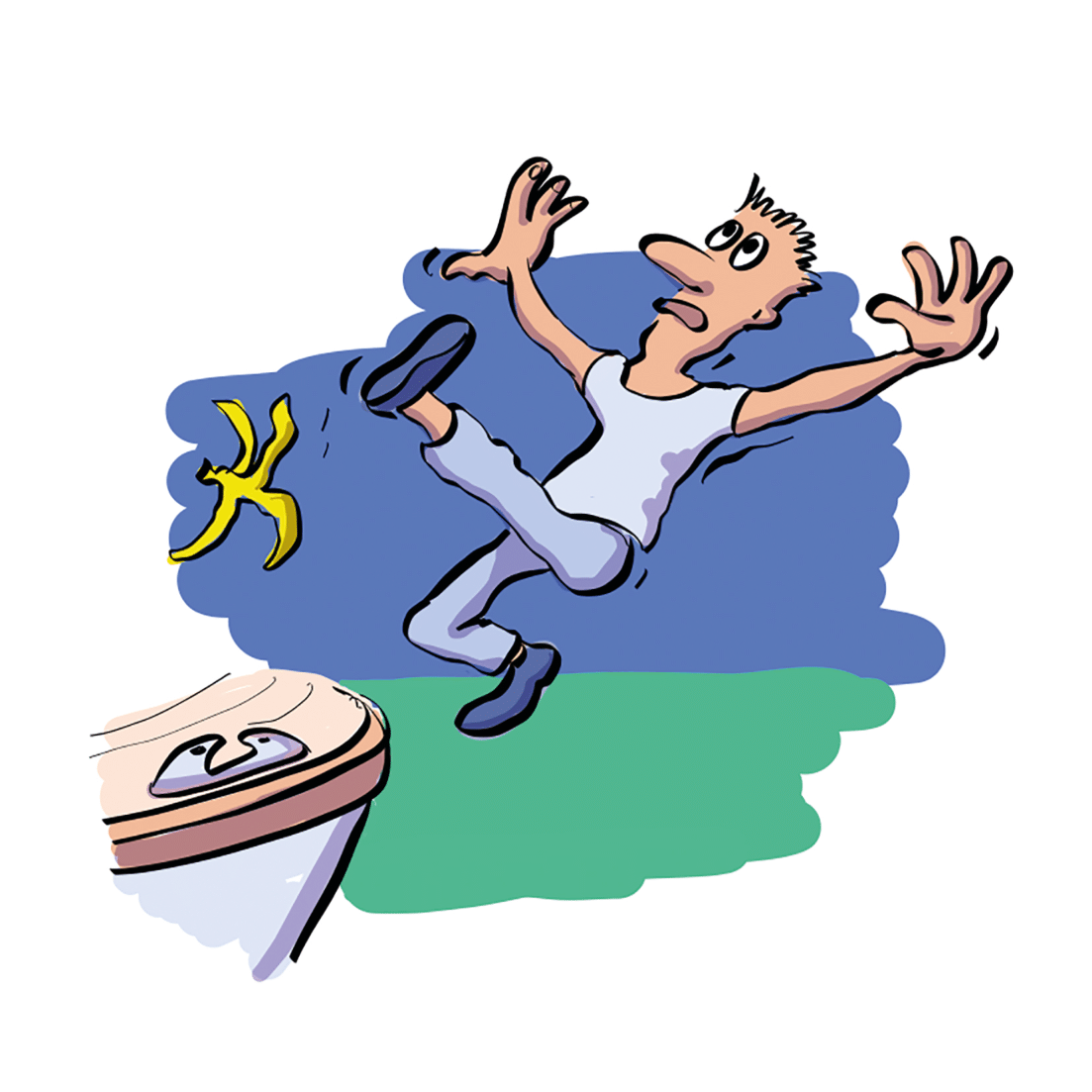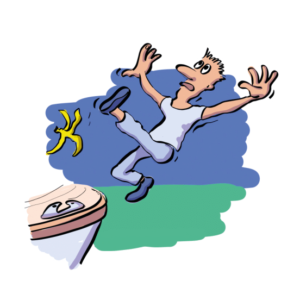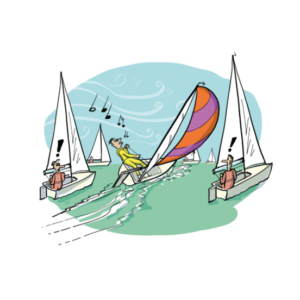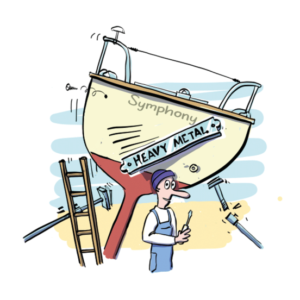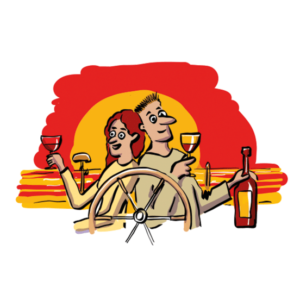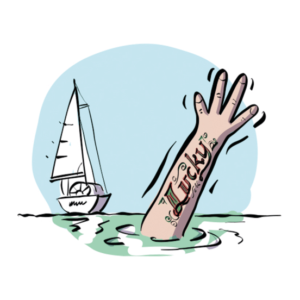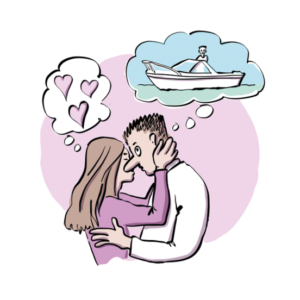The first time I was invited on a sailboat, there were a few rules to abide by: have a lifejacket, wear closed toe, non-marking shoes, and under no circumstance was I to bring a banana on board. The captain was not a picky eater, rather, he followed a set of ancient boating superstitions that still hold power over boaters today.
Why the superstitions? The origins of these beliefs stem from early days at sea when sailors ventured into uncharted waters for fishing, trading and exploration. At a time when scientific explanations for the various dangers and phenomena were unknown, these mariners put faith in the greater powers to help guide their safe passage. Believing in superstitions was a way to have a sense of control, when so many important parts of their life were unpredictable.
With technology, experience and documentation, boating today is a much more understood and safe adventure. However, since these beliefs seemed to work for centuries, many boaters don’t want to mess with a good thing. Over the years, these myths and superstitions have continued to grow and some of the true origins have been lost to time. But it’s still fun to speculate on how these things become accepted. Here’s a look at some classic, and odd, superstitions to boat by.
No Bananas Allowed
This first superstition is perhaps the silliest, but also the most fun. Dating back to the 1700s, on trade routes between Spain and the Caribbean, spiders and snakes would often hide in crates of bananas. Since both can cause harmful and deadly bites, the fear was that having crates of bananas on board put the crew members at risk.
This troublesome fruit was also notorious for spoiling cargo during fruit trades. Before it was widely understood that bananas release ethanoyl, which speeds up the ripening process, bananas were responsible for rotting other fruits on board, and jeopardizing the ship’s cargo.
Fishermen on board also had a problem with this fruit. The theory goes, that since bananas decayed so quickly, ships carrying bananas had to travel quickly to make sure they wouldn’t spoil before reaching port. At this increased rate of speed, those wanting to troll for fish did not have the time or opportunity to catch anything. There is another theory that ethanoyl also repels fish. Therefore, bananas on the boat came to mean no fish.
It could all be folklore, but when former Pacific Yachting editor Dale Miller, and sales executive Tyrone Stelzenmuller did their first Vic-Maui race, they found themselves in open seas with zero wind. A crossing that averages two weeks left the crew at sea for 21 days. After nearly running out of food and water, they had to make the challenging decision to abandon the race. Right around the time when that decision was made, they found a bag of trail mix containing dried banana slices. Coincidence?
Right Foot Forward
The well-known phrase “get off on the right foot” stems from ancient belief that the left side of the body is cursed. In Latin, the word sinister, means “on the left side” and thus during the Middle Ages with predominantly right-handed populations, certain religions associated left with evil. Sailors put a lot of faith in superstitions to guide them, so when getting on to a boat, one was to step with the right foot first to ensure safe passage. If by chance the left foot was used first, the immediate response was to throw the person’s shoes overboard in an attempt to undo this bad omen. These days, left-handed people aren’t shunned by society, but the next time you’re stepping on a boat, think about which foot goes first. Because why risk it?
No Whistling
You know how to whistle don’t you? Well, according to mariners, it’s best you don’t. Whistling on a boat is considered to be a challenge to the wind gods and it will stir up the wind, get it moving and cause bad weather and rough seas. The same could be said of singing and clapping, which are said to be able to trigger a thunderstorm. However, for sailors who happen to be stuck in windless waters, whistling could be used to their benefit, to bring on the wind and get the boat moving. This superstition, unfortunately, did not turn out to be true for the fateful crew on the aforementioned Vic-Maui race.
Don’t Change a Boat’s Name
The name of the boat is both spiritual and practical. Once a boat is named, it has been recorded in Poseidon’s “Ledger of the Deep,” which keeps track of boat names travelling the sea and ensures that no harm comes to boats that are listed. To change a boat’s name, means you’re trying to trick the sea gods, which everyone knows is a very bad idea. From a practical point of view, trade ships relied on their reputations at the various ports of call, and to change the name of the boat could make it difficult for a captain and crew to do business—if the name was unrecognizable.
If a boat needs to be renamed, there are critical steps to take in the de- and renaming process. These steps include removing any traces of the boat’s old name, including logbooks, paperwork and the name on the hull, as well as different ceremonies like the classic ritual of writing the original name on a piece of paper, folding it, putting it in a box and burning it. The ashes are then tossed into an outgoing tide. An offering to TK is also expected, lest he should take offense to the boat’s new name. Once all traces of the boat’s former name are destroyed, the boat can be christened with a new name.
Cats are Good Omens
Cats have been a welcomed crew member since the early days of sailing. Trading, exploration and naval ships all made sure to have a ship cat to control the rat population on board. Rats were notorious for gnawing on ropes and wood, stealing food and, later, chewing on wires. Most importantly, they would spread disease to the food and people on the boat. The cat’s role was to hunt, catch and eliminate these rodents.
With long travel routes, cats were also a source of comfort to the sailors. Rumour has it, if a cat approaches you, it brings good luck. On the contrary, if it turns away, it brings bad luck. So even though rats on board aren’t much of a problem for cruisers these days, it is still in your best interests to make sure the ship’s cat is well fed and treated with respect.
Red Sky at Night, Sailor’s Delight; Red Sky in Morning, Sailors Take Warning
This iconic rhyme has been a trusted weather forecaster more than 2,000 years. Cited in the New Testament, the trusted phrase was “established wisdom that prevailed among the Jews of the First century AD by Jesus in Matthew 16:2-3.”
The theory goes, if the sky is red at sunset, high pressure and stable air are approaching from the west. This is a good indicator of calm waters and smooth sailing. At dawn, red indicates approaching rain, and possibly stormy seas. Superstition or scientific fact, this has long been a tell-tale for sailors to help plan their voyages.
Get a Tattoo
Tattoos are not just for aesthetics; they are said to bring good omens. With sailors being a superstitious bunch, it makes sense that they believe in the power of symbols. Enter the tattoo. This body armour was an approach to attract luck and repel misfortune. Classic nautical art like the compass rose, anchor and nautical star are powerful symbols, said to guide the sailor home safely. Other art was to repel bad luck. Some quirky tattoos were roosters and pigs on the feet to prevent the sailor from drowning. In early times, many seamen were unable to swim and they believed gods would have mercy on them during a shipwreck if they saw the images of animals on their feet. Why roosters? This superstition may have rooted from stories of shipwrecks, where lighter livestock often survived because their crates would float in the ocean. In the days of long, slow ocean passages, tattoos were also a way to pass the time. (No tattoos were applied during the aforementioned Vic-Maui.)
It’s a She
Boats are commonly referred to as a she, but why? A straightforward reason could be the Latin word navis is feminine. However, the more exotic, exciting and romantic explanation is that boats were traditionally dedicated to goddesses or captain’s wives who were believed to protect the ship from danger. “She” naturally evolved as a lasting legacy and as a protector from the dangers of the sea. This is ironic since women were banned on boats for ages. These days, boats are named after all sorts of things, but the tradition of referring to them as “she” lives on.
